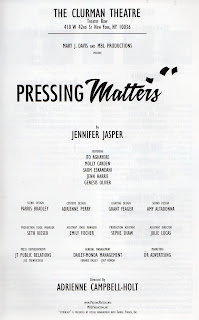"Depressing Matters"
When I first saw the title of this flimsy program of one-acters by Jennifer Jasper I thought it would be a great one for a play about the dry cleaning business. One of the five plays on the program, “Thanksgiving in July,” does indeed show clothes being pressed on an ironing board, but whether that’s where the title comes from or not is anybody’s guess. Otherwise, the pressing matters dramatized here are the ordinary ones most of us experience in the course of our lives. And many of them are depressing.
Every season has a tiny number of programs devoted to one-acts, or, to use what now seems to be their more usual name, short plays, perhaps because of the plethora of one-acts running from an hour or so to nearly two without a break. The long one-act, in fact, is as ubiquitous as the two-act; if you’re seeing a three-act or longer play it’s surely a revival.
Few writers, David Ives being one of the exceptions, have succeeded in the short play category. Neil LaBute is a frequent contributor to the genre but I’ve never seen a satisfactory example from his pen. Like almost all the other programs I’ve viewed over the past five years, Jasper’s has moments of interest but, on the whole, is seriously flawed.
Each play is introduced by having an actor put plastic stick-on letters onto a small blackboard hung at one or the other side of the stage, but never both sides simultaneously. If you're not sitting in the right seat you'll have trouble seeing what's on the board. It would have been better to use large cards, the way old-time vaudeville used to do.
 |
| Oliver Genesis, Ito Aghayere. Photo: Russ Rowland. |
“et-y-mol-o-gy,” running only 10 minutes, begins the evening with the kind of stunt concept you might expect from a class project: take seven words and write a play around them. The lives of Calvin (Genesis Oliver) and Susan Anne (Ito Aghayere) are encapsulated in the context of a spelling bee. A series of words is announced, spelled out, and their connection to the characters’ relationship from grade school to old age enacted, all with only two chairs, to mark the passing years. Two lives are thus sketchily encompassed within words ranging from “flatulence” to “Alzheimer’s.”
 |
| Ito Aghayere, Oliver Genesis. Photo: Russ Rowla |
In “Inheritance,” reminiscent of Schnitzler’s La Ronde, Bernard (Saum Eskandani) is upset at his wife Betty (Jenn Harris) for having gotten pregnant again, since money is so tight. Their scene morphs into one in the 1970s where Betty has died and Bernard, older, argues with Joan (Aghayere), the grown daughter with whom Betty was pregnant. This links to a scene right after between Joan, a feminist, and Ian (Oliver), whom she meets at an equal rights rally, followed by one, years later, between Ian and his daughter by Joan. It’s a viable structure but the characters and situations are so flatly banal the result is more an idea than its fulfillment.
The one play that might have a longer shelf-life, perhaps as an acting-class piece, is “Free Range,” in which Judy (Harris) is seated in a courtroom while questioned by an offstage attorney (Oliver) about an incident involving her two young kids. It has a smartly satiric touch regarding the overprotectiveness of modern child-raising methods. Harris gives it the only performance of the program that rises above mediocrity.
 |
| Saum Eskandani, Molly Carden. Photo: Russ Rowland. |
“Oscar Clyde Denman” is an odd piece that follows a girl named Miss (Molly Carden) from age 11, when her father (Genesis) sexually molested her, to young womanhood, years in which she was unable to live a normal life because of her obsessive compulsive disorder. Representing her OCD is the eponymous Oscar Clyde Denham (Eskandani), an ever-present, British-accented butler dressed in tails. He stands against her bedroom wall until needed to advise and restrain Miss from doing something, like leaving for college or having a romance, she might regret. Again, a potentially viable idea is too innocuously dramatized and weakly acted, particularly by Eskandani, to make an impression.
 |
| Molly Carden, Jenn Harris. Photo: Russ Rowland. |
Two plays follow the intermission on the nearly two-hour program. First is “Thanksgiving in July,” another work that plays with time, not always clearly. It pictures the relationship between two women, Essie (Carden) and Chloe (Harris), married to each other, as they prepare for a family Thanksgiving dinner in July because Chloe is dying and may not make it to November. It’s a poignant, if soapy, premise with characters and dialogue merely skimming the surface.
 |
| Oliver Genesis, Ito Agahayere, Saum Eskandani, Jenn Harris. Photo: Russ Rowland. |
Finally, in “Destination Unknown,” Jasper goes for comedy in a scene set in an airport boarding area controlled by a difficult ticket agent (Harris) whose treatment of the frustrated passengers waiting to board a delayed flight is meant to be funny. The idea of mocking airport personnel and protocol is especially ripe for comical treatment at this moment, but “Destination Unknown” wouldn’t pass muster as an SNL sketch on an off night.
 |
| Jenn Harris, Oliver Genesis, Ito Aghayere, Saum Eskandani. Photo: Russ Rowland. |
Whatever hidden virtues might be dormant in Jasper’s plays, director Adrienne Campbell-Holt hasn’t revealed them in her plodding, low-energy, borderline amateurish staging. The performances only rarely rise above the mundane, and, with not much to praise about the production values, it’s best not to say anything about them at all.
OTHER VIEWPOINTS:
Clurman Theatre/Theatre Row
410 W. 42nd St., NYC
Through May 20



